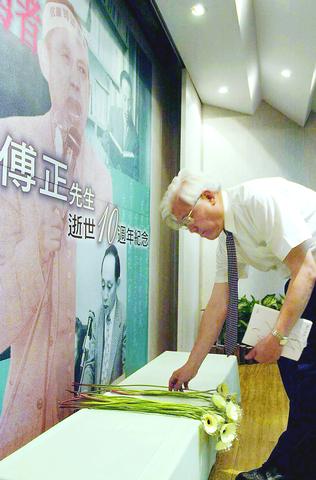Fu Cheng (
A memorial gathering was held yesterday to commemorate the deceased on the 10th anniversary of Fu's death of stomach cancer in 1991.
"Fu's [spirit] lives on. His contributions to democracy [in Tai-wan] will always be remembered," President Chen Shui-bian (

PHOTO: CHIANG YING-YING, TAIPEI TIME
"In Taiwan's history of democratic movements, Fu was the only figure involved in the foundation of two political parties. His political vision was foresighted and progressive," party secretary-general Wu Nai-jen (
Fu's 63-year life was full of ups and downs.
He survived the civil war between the KMT and the communists and fled to Taiwan with the KMT forces. Having witnessed the calamity of war, Fu realized that "only democracy can save people from being held at gunpoint."
From then on, "Fu had used Taiwan as a hinterland for democracy," said Academia Historica President Chang Yen-hsien (張炎憲).
As a former KMT political worker who had a close relationship with then-premier Chiang Ching-kuo (
After being released from prison, Fu allied with 17 other activists and founded the DPP.
At that time, Fu was one of the few mainlander members who joined the hard-line pro Taiwanese independence party.
In 1989, Fu ran for a legislative seat on the party's behalf, but failed to win, gaining only 30,000 votes.
Polls showed most of his votes came from mainland groups, not from DPP supporters.
Because of his background, Fu had problems with getting involved in the DPP, but he still fully devoted himself to the party's political ideals and policies.
"He once told me that he could not understand the Taiwanese language, which was mostly used during the DPP's meetings," said former DPP Chairman Chang Chun-hung (
"Fu attended almost every meeting and took notes in such detail, that impressed me very much," said DPP's Hsinchu City Mayor Tsai Jen-chien (
Fu was never among the DPP mainstream. But his insistence on democracy earned great respect among party members.
Though not accepted, he continued to urge the party to put aside issues over Taiwanese independence and unification with China and to focus on Taiwan's democratization.
"His advocacy was later proved to be correct," Wu said, while former Taipei County Commissioner You Ching (尤清) added that "his courage endowed us with power."

LONG FLIGHT: The jets would be flown by US pilots, with Taiwanese copilots in the two-seat F-16D variant to help familiarize them with the aircraft, the source said The US is expected to fly 10 Lockheed Martin F-16C/D Block 70/72 jets to Taiwan over the coming months to fulfill a long-awaited order of 66 aircraft, a defense official said yesterday. Word that the first batch of the jets would be delivered soon was welcome news to Taiwan, which has become concerned about delays in the delivery of US arms amid rising military tensions with China. Speaking on condition of anonymity, the official said the initial tranche of the nation’s F-16s are rolling off assembly lines in the US and would be flown under their own power to Taiwan by way

CHIP WAR: The new restrictions are expected to cut off China’s access to Taiwan’s technologies, materials and equipment essential to building AI semiconductors Taiwan has blacklisted Huawei Technologies Co (華為) and Semiconductor Manufacturing International Corp (SMIC, 中芯), dealing another major blow to the two companies spearheading China’s efforts to develop cutting-edge artificial intelligence (AI) chip technologies. The Ministry of Economic Affairs’ International Trade Administration has included Huawei, SMIC and several of their subsidiaries in an update of its so-called strategic high-tech commodities entity list, the latest version on its Web site showed on Saturday. It did not publicly announce the change. Other entities on the list include organizations such as the Taliban and al-Qaeda, as well as companies in China, Iran and elsewhere. Local companies need

CRITICISM: It is generally accepted that the Straits Forum is a CCP ‘united front’ platform, and anyone attending should maintain Taiwan’s dignity, the council said The Mainland Affairs Council (MAC) yesterday said it deeply regrets that former president Ma Ying-jeou (馬英九) echoed the Chinese Communist Party’s (CCP) “one China” principle and “united front” tactics by telling the Straits Forum that Taiwanese yearn for both sides of the Taiwan Strait to move toward “peace” and “integration.” The 17th annual Straits Forum yesterday opened in Xiamen, China, and while the Chinese Nationalist Party’s (KMT) local government heads were absent for the first time in 17 years, Ma attended the forum as “former KMT chairperson” and met with Chinese People’s Political Consultative Conference Chairman Wang Huning (王滬寧). Wang

OBJECTS AT SEA: Satellites with synthetic-aperture radar could aid in the detection of small Chinese boats attempting to illegally enter Taiwan, the space agency head said Taiwan aims to send the nation’s first low Earth orbit (LEO) satellite into space in 2027, while the first Formosat-8 and Formosat-9 spacecraft are to be launched in October and 2028 respectively, the National Science and Technology Council said yesterday. The council laid out its space development plan in a report reviewed by members of the legislature’s Education and Culture Committee. Six LEO satellites would be produced in the initial phase, with the first one, the B5G-1A, scheduled to be launched in 2027, the council said in the report. Regarding the second satellite, the B5G-1B, the government plans to work with private contractors